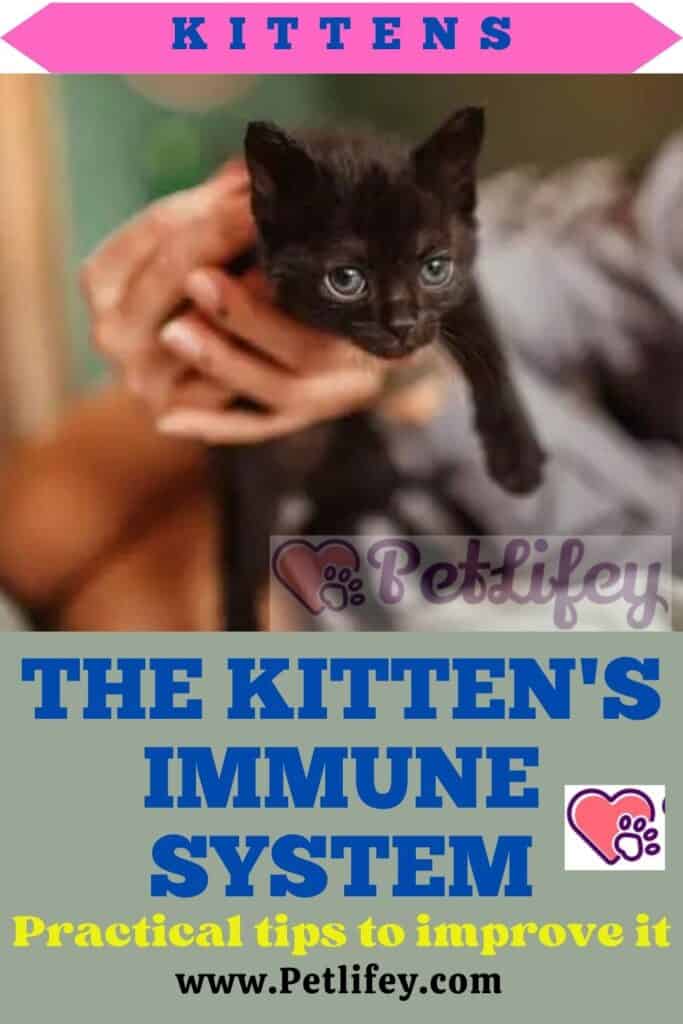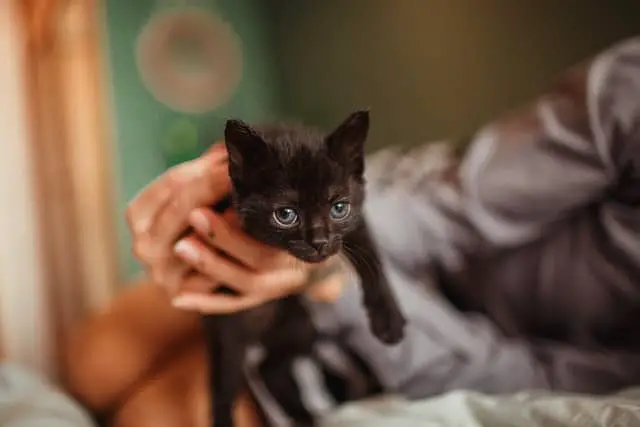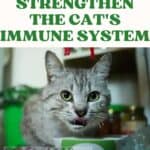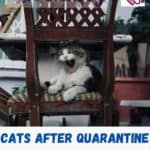
If a kitten doesn’t develop strong defenses right from the start, they can be in big trouble. So, how to improve the kitten’s immune system?
The immune system is the body’s defense system against germs (e.g. bacteria and viruses). Kittens need a functional immune system to survive and this first immunity is provided by the mother (passive immunity) and will only later develop within the kitten itself. Passive immunity is provided through the first breast milk (called colostrum). Colostrum is rich in proteins called antibodies, which boost kittens’ immune systems once absorbed into the body. But if a kitten does not develop a strong immune system, what to do?
The weak immune system
Puppies are born with an immature immune system that is unable to respond to infections. This means that puppies need to get some protection from their mothers after birth. Drinking colostrum (a mother’s first milk) early in life boosts their immune systems, so they can grow up healthy.
Colostrum is rich in antibodies that can be absorbed through a newborn kitten’s gut and into the blood, providing them with antibodies in their blood streams and providing immunity to some infectious diseases. It is incredibly important for the kitten to get enough colostrum immediately after birth for the puppy to survive. If kittens don’t get enough colostrum, they have a higher risk of infection, sepsis, and neonatal isoerythrolysis.
What is colostrum and what it provides
Colostrum is the milk produced by a mother cat for the first 24 hours after giving birth. It is produced by the mammary glands and is generally slightly off-white or yellow in color, and is slightly denser than regular milk. It is best for the kitten to drink colostrum from their mother, as she will have developed immunity to infectious agents in the area they live in.
An alternative source of this all-important nutrient includes colostrum from another healthy mother cat, although the mothers’ blood groups should be checked, as there is a risk of causing anemia in kittens if the blood types are not compatible (known as neonatal isoerythrolysis, which we mentioned earlier). Before using a different mother cat, it’s worth talking to a vet .
Another option is to use serum (separated blood) from a healthy adult cat. However, we should always discuss this option with a veterinarian. Ideally, all donors should live in the same environment as the kittens, so that the cat has developed immunity to the same germs that kittens might come into contact with in that particular location.
Colostrum is rich in energy, nutrients, growth factors and antibodies. The antibodies boost the kitten’s immune system, providing protection from infectious diseases until her immune system develops and matures. Antibodies provide protection in two ways, by directly binding germs in the gut and also by absorbing them into the bloodstream.
The antibodies present in colostrum can only be absorbed into the blood for a short period of time after birth (approximately 24 hours). After this period, the intestine is no longer able to absorb antibodies. Colostrum is also rich in other hormones and growth factors, which help kittens to grow and their organs to develop .
How to strengthen the kitten’s immune system?
It is important to try to get a kitten to breastfeed as soon as possible, to ensure good absorption of antibodies from the colostrum. To ensure that the colostrum is of the best possible quality, it is important to feed the mother cat good quality food during pregnancy and lactation, and to ensure that she is fully vaccinated. If the mother cat is not producing milk or the kitten is not suckling, it may be necessary to speak to a veterinarian about administering the newborn kitten serum to provide protection.
When a kitten is born their immune systems are immature (i.e. weak) which means they are unable to respond properly to infections. A kitten gains immunity from the mother’s colostrum in the form of antibodies, which help protect the kitty from infections that the mother has previously been exposed to.
As a kitten grows and matures, its immune system develops and becomes stronger, meaning its own body can respond to infections. As the kitten’s immune system develops, the immunity acquired by the mother wears off, usually around the time when vaccinations are recommended.
Alternatives to colostrum

It is important to ensure that the kitten gets enough colostrum and feeds well from the mother within the first few hours after birth. If a mother cat is not producing milk, we may want to talk to a vet about how you can help.
Alternatives to mother’s colostrum are: colostrum from another mother cat who has just given birth, or serum from a healthy adult cat. It is best to discuss this with a veterinarian, as the cats’ blood types may need to be checked to make sure they are not causing anemia in the kittens. It is not a good idea to use colostrum from another species, such as from a dog or a cow.
If you have any concerns about your puppy, it is always best to speak to a veterinarian about ways we can help him. This may include asking how to encourage the infant, or what to do if the mother cat is not producing milk, or not allowing the kittens to breastfeed. When planning a pregnancy, we should also make sure that the mother cat is fully vaccinated. We talk to a vet about how to adjust the mother cat’s diet to make sure she produces the best quality colostrum possible.






